1. The Fabelmans
by Steven Spielberg
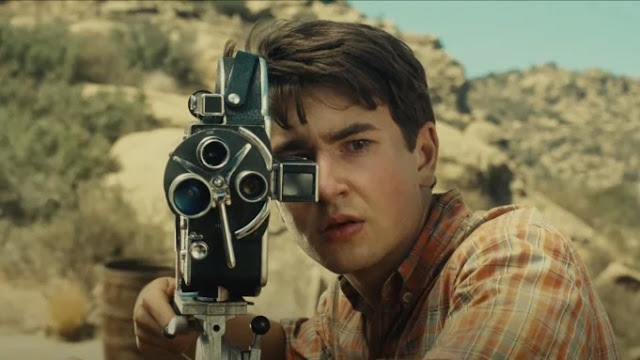
Though it's tempting to say he waited his whole life to let us in, it's more accurate to say he drew us a map and then finally, after decades on the path, we got to where X marks the spot. A man famous for softening us for life's bitter disappointments has finally shown us his own, let us know that all that fantasy, all those impossible things, they were for him as much as for anyone else. Maybe some suspected it all along, but to give us a movie this thorny, this odd, this heartrending and naked, that is a gift. One he knows we can't repay (and America didn't) but he doesn't need it. This is for him and but for people who've been waiting to get here, it's the most wonderfully honest piece of American film art in an age. Revealing at last the source of his perversity, the cries he's been soundproofing in his head, the lack he's been filling, the young man who became the movies themselves. The emotional clarity is magnificent, of course, but so is every composition, every movement of the camera, every sweaty set-piece in which he lets the phantom shape of his friend Brian De Palma ghost direct when he hasn't always the heart to admit things on his own. He's become the director he always set out to be, the man who can entertain you, who can make you cry unabashedly, who can make you think about your own life the way he thinks about his, and he's done it all honestly. He's opened up the doors of the spacecraft at long last and let us in. I can see now why his characters never want to leave the fantasy. Even when it's this thorny, this bleak, this upsetting...there's still no more wonderful place to spend time. "Where's the horizon?" A person and an angle can always change, or they might change history.
2. EO
by Jerzy Skolimowski
 From one old master looking back to another, the perpetual prankishness and grammatical insouciance of Jerzy Skolimowski has at last found its sheath. The punk rocker behind the camera remains, but he's got something important on his hands; the memory of his favourite movie, the movie that made him forget that he too was an artist. How could he share the same class, nay, the same gene pool, with Robert Bresson. If none of his wildly inventive works have earned him that place, than, definitively, with EO, he's earned it. He is a filmmaker worthy of Bresson because he found the soul of the mule from the other angle, with all the blinding, flashing lights and post-Godardian experimentation, everything Bresson would never have allowed himself. And yet there is no loss of meaning. No loss of sight. No greater distance between us and the mule. The waggish formal daring, the dizzying array of angles, the things which Skolimowski's late period has made us accustomed to experiencing, they are more focused than usual, absolutely, but there is no less a sense of possibility here for all his reverence for the great work of art that so stunned him as a younger man. Au Hasard Balthazar is mightier now because we know what it pulled out of an artist as usually inscrutable as Skolimowski. And EO is one of the finest modern films.
From one old master looking back to another, the perpetual prankishness and grammatical insouciance of Jerzy Skolimowski has at last found its sheath. The punk rocker behind the camera remains, but he's got something important on his hands; the memory of his favourite movie, the movie that made him forget that he too was an artist. How could he share the same class, nay, the same gene pool, with Robert Bresson. If none of his wildly inventive works have earned him that place, than, definitively, with EO, he's earned it. He is a filmmaker worthy of Bresson because he found the soul of the mule from the other angle, with all the blinding, flashing lights and post-Godardian experimentation, everything Bresson would never have allowed himself. And yet there is no loss of meaning. No loss of sight. No greater distance between us and the mule. The waggish formal daring, the dizzying array of angles, the things which Skolimowski's late period has made us accustomed to experiencing, they are more focused than usual, absolutely, but there is no less a sense of possibility here for all his reverence for the great work of art that so stunned him as a younger man. Au Hasard Balthazar is mightier now because we know what it pulled out of an artist as usually inscrutable as Skolimowski. And EO is one of the finest modern films.
3. Irma Vep
by Olivier Assayas
 It was perhaps inevitable that the man who made the movie that most accurately captures the living dead heart of the modern film economy would be the man who's been chasing ghosts and conspiracies across the globe for decades. His ambient thrillers drop the scent of murder and lead him here, to a remake of his own remake, the completion of his own prophecy. He puts himself, his work, his cheap soul, his place in the streaming economy, his place in his collaborators' hearts (in some cases: nowhere), his ambition, and his fractured legacy under the microscope while refusing to give us anything like a conventional entertainment. Thank heaven. Assayas' crowning achievement. His great novel on being alive in the 21st century, on being Olivier Assayas when being anyone else might be easier.
It was perhaps inevitable that the man who made the movie that most accurately captures the living dead heart of the modern film economy would be the man who's been chasing ghosts and conspiracies across the globe for decades. His ambient thrillers drop the scent of murder and lead him here, to a remake of his own remake, the completion of his own prophecy. He puts himself, his work, his cheap soul, his place in the streaming economy, his place in his collaborators' hearts (in some cases: nowhere), his ambition, and his fractured legacy under the microscope while refusing to give us anything like a conventional entertainment. Thank heaven. Assayas' crowning achievement. His great novel on being alive in the 21st century, on being Olivier Assayas when being anyone else might be easier.
4. Exterior Night
by Marco Bellocchio
 The last modernist composes another perfect symphony, a poison pen letter to the country that raised him and betrayed him, the place where brothers died and no one was ever brought to justice who couldn't be replaced.
The last modernist composes another perfect symphony, a poison pen letter to the country that raised him and betrayed him, the place where brothers died and no one was ever brought to justice who couldn't be replaced.
5. Earwig
by Lucile Hadžihalilović
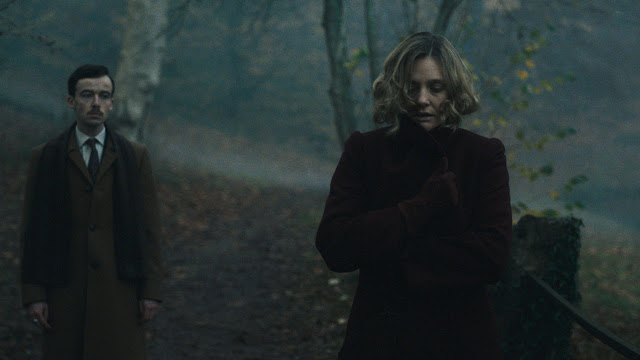 Men all talk a big game about bringing back the tactile thrills of the B movies of yore, but its women who do the more important task of sickeningly reviving the eroticism and vapor-struck hermeticism of 60s and 70s arthouse. Lucile Hadžihalilović has been chasing the unyielding highs and knee scraping lows of John Huston's strident literary adaptations, Jerzy Skolimowski's sexual confusion, Wojciech Has' inch-thick atmosphere of madness, and the predatory identity crises in the works of Catherine Breillat and Sandy Whitelaw. Well she's come up with something worthy of all of them (indeed, quite a bit better than most). Here we see her adapt a work of cultish skullduggery in which the business of a man with nothing to lose is presented in appalling darkness and dankness. The tone of these scenes falls somewhere between watching an undertaker dress a corpse or a soldier defuse a bomb. He cares for a child without any love for her because he has no love for himself. He tortures himself and others for the crime of his still having to live. He thinks something might save him but nothing could. He is, quite obviously, like everyone in Hadžihalilović's oneiric bureaucracy. His misery is the tip of the iceberg. And yet her camera's tightly coiled gaze, the wafting sound design that screams silences at us, and the sun's refusal to shine on this world of thieves, walking suicides, and killers all mark this as an uncommon feat indeed. The evil twin of Orson Welles The Trial. A major work.
Men all talk a big game about bringing back the tactile thrills of the B movies of yore, but its women who do the more important task of sickeningly reviving the eroticism and vapor-struck hermeticism of 60s and 70s arthouse. Lucile Hadžihalilović has been chasing the unyielding highs and knee scraping lows of John Huston's strident literary adaptations, Jerzy Skolimowski's sexual confusion, Wojciech Has' inch-thick atmosphere of madness, and the predatory identity crises in the works of Catherine Breillat and Sandy Whitelaw. Well she's come up with something worthy of all of them (indeed, quite a bit better than most). Here we see her adapt a work of cultish skullduggery in which the business of a man with nothing to lose is presented in appalling darkness and dankness. The tone of these scenes falls somewhere between watching an undertaker dress a corpse or a soldier defuse a bomb. He cares for a child without any love for her because he has no love for himself. He tortures himself and others for the crime of his still having to live. He thinks something might save him but nothing could. He is, quite obviously, like everyone in Hadžihalilović's oneiric bureaucracy. His misery is the tip of the iceberg. And yet her camera's tightly coiled gaze, the wafting sound design that screams silences at us, and the sun's refusal to shine on this world of thieves, walking suicides, and killers all mark this as an uncommon feat indeed. The evil twin of Orson Welles The Trial. A major work.
6. The Eternal Daughter
by Joanna Hogg

In a corner of misty, mythic Wales a woman enlists strangers and intimate relations alike to appear in a passion play, a story of the loss of her god, her mother. Creeping dutch angles looking up haunted staircases into a brain trying hard to keep its secrets locked away. When we know what's happening we understand why she worked so hard to stay unreadable, a blank. And yet under each half-suggested gesture of reconciliation, of every conversation with her memory, we see the churning interior struggling to break out and flood this corner of the world. "When I was a child, running in the night, afraid of what might be. Hiding in the dark, hiding in the street and of what was following me..." Hiding always, but only from yourself. Everyone else can see you're alone.
7. Crimes of the Future
by David Cronenberg
 Presented with the death of art (the death of the planet, too; they go hand in hand thanks to corporate sponsored formless content and the destruction of the rainforest to sell useless tokens of exclusivity to morons), our poet of sickness returned. His latest is a work of the fragility of the artist's ego and body. As he discovers new avenues of self-expression, he grows weaker and weaker. It helps not at all that his art is the sight of his own destruction at the hands of a lover. The message is hard to miss: we still kill the old way. When we no longer risk, art is nothing. Cronenberg will always risk everything.
Presented with the death of art (the death of the planet, too; they go hand in hand thanks to corporate sponsored formless content and the destruction of the rainforest to sell useless tokens of exclusivity to morons), our poet of sickness returned. His latest is a work of the fragility of the artist's ego and body. As he discovers new avenues of self-expression, he grows weaker and weaker. It helps not at all that his art is the sight of his own destruction at the hands of a lover. The message is hard to miss: we still kill the old way. When we no longer risk, art is nothing. Cronenberg will always risk everything.
8. Hold Me Tight
by Mathieu Amalric
One of the greats does his thing with casual majesty.
9. A Couple
by Frederick Wiseman

The title a knowing joke, a play on the absence of the lover with whom we are always conversing but who is never present. Wiseman's documentarians eye locates the perfect setting for a treatise on lost love, of endless sacrifice, of never having enough. Even in all this beauty, a human cannot be happy because we don't answer to nature. Tolstoy knew it, and so does did Sophie, his widow. It's people to whom we answer. Wiseman tries constructing a portrait of a relationship as he would the inner workings of a city council or a studio, by psychologically mapping it when he can't do it physically. We know what it was like to be in their house together with the dozen children and the roughness of the master of the house. We know more about her life in Nathalie Boutefeu's pauses than we do about people we've met. We know about not giving up love just because someone dies, and giving it up because it hurts to be near someone whose own love is terrible and wonderful at once. What is the "job," the "purpose," of the muse, the loyal partner, other than to appear in reflection? Wiseman thought that such a person deserved the spotlight, some understanding, as much as we afford the man whose name carries her identity a hundred years after her death.
10. Against Time
by Ben Russell
 The great avant-garde missive of 2022.
The great avant-garde missive of 2022.
11. Detective Vs. Sleuths
by Wai Ka-Fai
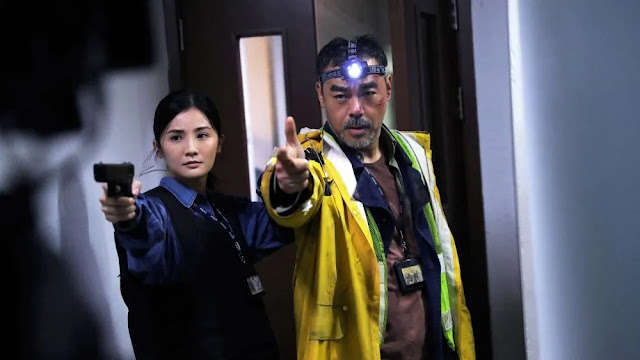 Johnny To once said of his creative partner Wai Ka-Fai "I really believe in Wai Ka-fai’s creativity: his writing, his ideas, everything....I can’t find any one else in Hong Kong like him: his discipline, talent..." That may be because there is no one else in Hong Kong like Wai Ka-Fai but it's perhaps more accurate to say there is no one alive like him. The director's latest, his cap on a trilogy of off-kilter detective stories, is a film of impossible geometry and exhausting physics. The camera leaps through time and space, destroying everything it touches and rebuilding it with the snap of its lead characters finger gun. Ten thousand ideas a second lead this man, haunted by the crimes he didn't solve, towards the case that could change the course of his life. Our director, the maddest detective of all, juggles genres, timelines, and realities with a Cheshire Cat grin. This? I mean how else am I supposed to make movies? A pleasure to be on his roller coaster, to be held hostage by genius.
Johnny To once said of his creative partner Wai Ka-Fai "I really believe in Wai Ka-fai’s creativity: his writing, his ideas, everything....I can’t find any one else in Hong Kong like him: his discipline, talent..." That may be because there is no one else in Hong Kong like Wai Ka-Fai but it's perhaps more accurate to say there is no one alive like him. The director's latest, his cap on a trilogy of off-kilter detective stories, is a film of impossible geometry and exhausting physics. The camera leaps through time and space, destroying everything it touches and rebuilding it with the snap of its lead characters finger gun. Ten thousand ideas a second lead this man, haunted by the crimes he didn't solve, towards the case that could change the course of his life. Our director, the maddest detective of all, juggles genres, timelines, and realities with a Cheshire Cat grin. This? I mean how else am I supposed to make movies? A pleasure to be on his roller coaster, to be held hostage by genius.
12. Shin Ultraman
by Shinji Higuchi
 Shinji Higuchi and his writer, the devilish mastermind Hideaki Anno return to the great monsters of the past once more in this fleet and frisky re-molding of a beloved icon of their childhood. Bureaucrats keeping Japan from crumbling under the weight of its hubris and its malfeasance are our heroes, literally in this case as one grows to the size of a skyscraper to combat monsters and Japan's own negative image. Countless images of people at high-stakes toil, each perfectly framed to keep us enthralled, and through it all a heartfelt message about responsibility. A monster can be anything, even a sleeping bystander, if improperly cared for. Not everyone can handle the responsibility of keeping your people from destruction. We live that every day, don't we?
Shinji Higuchi and his writer, the devilish mastermind Hideaki Anno return to the great monsters of the past once more in this fleet and frisky re-molding of a beloved icon of their childhood. Bureaucrats keeping Japan from crumbling under the weight of its hubris and its malfeasance are our heroes, literally in this case as one grows to the size of a skyscraper to combat monsters and Japan's own negative image. Countless images of people at high-stakes toil, each perfectly framed to keep us enthralled, and through it all a heartfelt message about responsibility. A monster can be anything, even a sleeping bystander, if improperly cared for. Not everyone can handle the responsibility of keeping your people from destruction. We live that every day, don't we?
13. This Much I Know To Be True
by Andrew Dominik

Nick Cave trusts Andrew Dominik like he does his own bandmates; maybe more. Warren Ellis has to translate Cave's sadness, his field stripped soul, into mosaics made of sound. Dominik carries the weight of the image of a bereft Cave, the sight of a man who lost his sons before they were old enough to know who they really were, before they'd experienced every great and dreadful thing their father has. In this windowless room, with a camera always present and acknowledged, Cave exorcises his demons, makes visible his pain and regrets, makes the hole in his heart into something full and real and excruciating. It takes bravery to wake up after losing your world. I don't know what to call what Cave exhibits here, but it broke my heart. An essential record of an artist's process, which necessarily includes living with death.
14. Living
by Oliver Hermanus
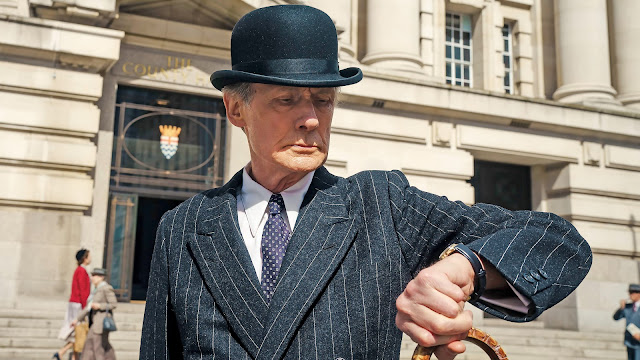
Ikiru didn't need to be remade, there's no way around that. And yet if anyone was going to use it like a boring tool to uncover the sadness at the heart of the English character, it was Kazuo Ishiguro. He came to England when he was young and his outsider's empathy has been his greatest tool in writing about humanity. To see the things the English give up for propriety, for what's right and good and orderly. More than a remake of Ikiru, it's like something out of Mary Shelley, where a monster of efficiency and disappointment discovers what it means to really be alive. His journeys to the lower depths yield experiences, sights, sounds, smells, friendships, that his existence would never have allowed him. Hermanus directs like Michael Powell is watching over his shoulder, watching him recreate the feel of a place unreachable and the look of England opening up like a flower in bloom. And then there's Bill Nighy, who will reach into you and touch your heart with the twitch of his face, the faraway stare with those dark blue eyes, the opening of an umbrella. Together these artisans have made something unique out of an no-win proposition. I'm glad they decided to remake Ikiru.
15. Nope
by Jordan Peele

For those who still have skin in the game.
16. Broker
by Hirokazu Kore-Eda
 A director whose depictions of the hardships of life on the fringes are casually devastating finds his most potent idea in a decade or more. A family who can't be a family, trying to decide the future of a baby none of them will admit to wanting to keep. The unvoiced agony of having the right words on the tip of your tongue and no power, no idea how to say them. A cast of megawatt Korean stars push through their dismal assignments, discovering too late the things about themselves that could have corrected every step of their path to misfortune.
A director whose depictions of the hardships of life on the fringes are casually devastating finds his most potent idea in a decade or more. A family who can't be a family, trying to decide the future of a baby none of them will admit to wanting to keep. The unvoiced agony of having the right words on the tip of your tongue and no power, no idea how to say them. A cast of megawatt Korean stars push through their dismal assignments, discovering too late the things about themselves that could have corrected every step of their path to misfortune.
17. The Severing / Going All The Way: Director’s edit
by Mark Pellington
 Mark Pellington looks back twice, on the formative traumas of his life, and at his first experience trying to shape his thoughts into images for the big screen. An artist in full control of his brushes, a man who sees it all clearly. May we all be so fearless before ourselves, before the synecdoches that make us up to people we'll never meet, to audiences yet unborn.
Mark Pellington looks back twice, on the formative traumas of his life, and at his first experience trying to shape his thoughts into images for the big screen. An artist in full control of his brushes, a man who sees it all clearly. May we all be so fearless before ourselves, before the synecdoches that make us up to people we'll never meet, to audiences yet unborn.
18. Lingui, the Sacred Bonds
by Mahamat Saleh-Haroun
 Mahamat Saleh-Haroun, perhaps the heir to Ousmane Sembene's neo-realism, makes his finest work to date, about the search for an abortion in a male-ruled society. It's the kind of thing that should be out of date but between Saleh-Haroun's earnest delivery and the nightmare of knowing such a crisis may never become obsolete. In this director's hands the search for the end of an ironclad amorality that only holds some accountable becomes the stuff of classical cinema. It's all the more horrible to know that for some people nothing changes. Even with all the testimony and art in the world to put the lie to the necessity of fascism and its control of the body, still the world turns in the exact direction it has for centuries. In the old fashioned decency of these characters and the old fashioned care put into this film's images, we find momentary shelter from the way of the world.
Mahamat Saleh-Haroun, perhaps the heir to Ousmane Sembene's neo-realism, makes his finest work to date, about the search for an abortion in a male-ruled society. It's the kind of thing that should be out of date but between Saleh-Haroun's earnest delivery and the nightmare of knowing such a crisis may never become obsolete. In this director's hands the search for the end of an ironclad amorality that only holds some accountable becomes the stuff of classical cinema. It's all the more horrible to know that for some people nothing changes. Even with all the testimony and art in the world to put the lie to the necessity of fascism and its control of the body, still the world turns in the exact direction it has for centuries. In the old fashioned decency of these characters and the old fashioned care put into this film's images, we find momentary shelter from the way of the world.
by Mark Jenkin
Jenkin's hand-woven folk tales find new patterns in the echoes of long ago loves, marooned sailors, and folk horror that used to burn bright in dreary English homes.
20. Ambulance
by Michael Bay
 Even after the tides have turned, and the crowds want something else, and the money is going towards a formless mass of gray, Michael Bay don't stop. He's a shark.
Even after the tides have turned, and the crowds want something else, and the money is going towards a formless mass of gray, Michael Bay don't stop. He's a shark.
21. Both Sides of the Blade
by Claire Denis

Claire's looked at infidelity before but perhaps never with such focus or clarity. Binoche and Lindon are their usual heart-stopping selves, trying to navigate the kind of difficulty only loving adults can give each other. The heart will take from you peace and happiness just like that. Your center can fall away at any moment because humans are unlike any other creature, and the usual sensuous form stares at a crumbling family with a burning regard, a desire to know more, a need for more awful intimacy. This is what it means to love, sometimes.
22. Vikram
by Lokesh Kanagaraj
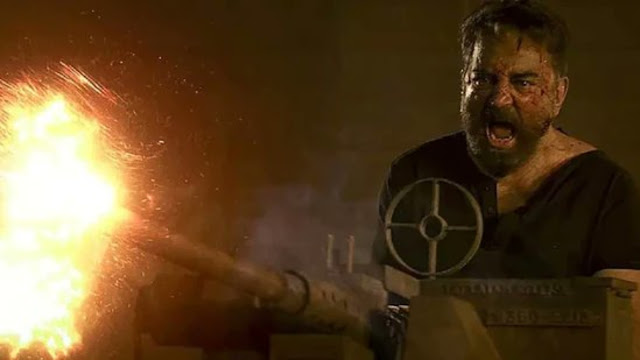 RRR will remain in the American groundwater, but it was riotously shown up by this saga of over-the-hill crooks out to right the wrongs of the past with .50 caliber bullets and bone-crunching body blows. Few films seem as genuinely interested in the inner lives of even their worst characters, to the point that a meth lab explosion is a genuine tragedy. Its kineticism was unmatched from even the very good action pictures this year, and its musicality turned street fights into boleros. Here men dance together by the train tracks as a prelude to killing each other at a wedding.
RRR will remain in the American groundwater, but it was riotously shown up by this saga of over-the-hill crooks out to right the wrongs of the past with .50 caliber bullets and bone-crunching body blows. Few films seem as genuinely interested in the inner lives of even their worst characters, to the point that a meth lab explosion is a genuine tragedy. Its kineticism was unmatched from even the very good action pictures this year, and its musicality turned street fights into boleros. Here men dance together by the train tracks as a prelude to killing each other at a wedding.
23. Deception
by Arnaud Desplechin
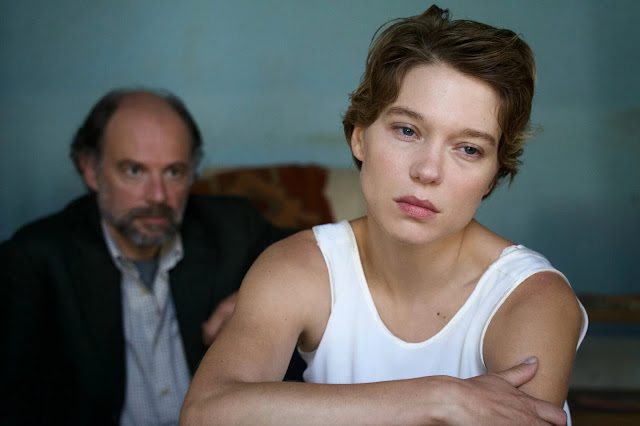 Desplechin's willingness to push himself and experiment with different tones, genres, and places is one of the more endearing things about him. He tried out a straight-down-the-plate police procedural, which didn't give him enough room to be himself, and recovered with this, a two-hander love letter set mostly in hotel rooms and beds. Lea Seydoux and Denis Podalydès capture the fervor of lust, of wanting so badly to tell someone everything you know, maybe more than you want to sleep with them. The warming touch of a mind open to yours, the feeling of entanglement with a body belonging to someone that wants to be there as much as you, Desplechin's films have always been about romances, big, small, fleeting, forbidden, but it's quite something to see him digging into a text where there's nothing between himself and the peculiarities of lust-as-love.
Desplechin's willingness to push himself and experiment with different tones, genres, and places is one of the more endearing things about him. He tried out a straight-down-the-plate police procedural, which didn't give him enough room to be himself, and recovered with this, a two-hander love letter set mostly in hotel rooms and beds. Lea Seydoux and Denis Podalydès capture the fervor of lust, of wanting so badly to tell someone everything you know, maybe more than you want to sleep with them. The warming touch of a mind open to yours, the feeling of entanglement with a body belonging to someone that wants to be there as much as you, Desplechin's films have always been about romances, big, small, fleeting, forbidden, but it's quite something to see him digging into a text where there's nothing between himself and the peculiarities of lust-as-love.
24. Kimi
by Steven Soderbergh
 Steven Soderbergh's tech thriller is shockingly analogue, from its simple premise, to its climactic cobbling together of Wait Until Dark and The Beastie Boys, this is a pop thriller decoupage genuinely sexy and terrifying. A director like Soderbergh isn't afraid of doing some damage, so we don't know who's making it out of this one alive. As always happens, a woman starts tugging at a thread and soon the whole sweater has collapsed on her and started to smother her. Cliff Martinez's score, one of his best, coats our hero's journey from shut-in cynic to most dangerous woman in the world in chilling textures. A reminder that they're always watching you, and the only thing stopping them from getting everything they want is that they're simply not very good at what they do. Now more than ever "the truth is, these are not very bright guys, and things got out of hand."
Steven Soderbergh's tech thriller is shockingly analogue, from its simple premise, to its climactic cobbling together of Wait Until Dark and The Beastie Boys, this is a pop thriller decoupage genuinely sexy and terrifying. A director like Soderbergh isn't afraid of doing some damage, so we don't know who's making it out of this one alive. As always happens, a woman starts tugging at a thread and soon the whole sweater has collapsed on her and started to smother her. Cliff Martinez's score, one of his best, coats our hero's journey from shut-in cynic to most dangerous woman in the world in chilling textures. A reminder that they're always watching you, and the only thing stopping them from getting everything they want is that they're simply not very good at what they do. Now more than ever "the truth is, these are not very bright guys, and things got out of hand."
25. RRR
by S.S. Rajamouli
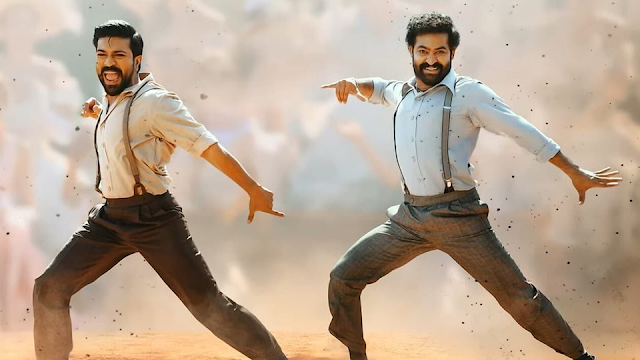 Perhaps the most profound entry in the modern "Dudes Rock" canon, this problematic number broke through in a way I didn't think movies did anymore. Sure it flirts with the superheroic but it's mostly about the real, unbreakable bonds of brotherhood. Such a thing is easily slotted into an evil context, but provided we keep our head above water it becomes very easy to enjoy the film's non-stop parade of spectacle. A party crashed by Noah's Ark, men with Terminator-like ability plowing through riots to catch their charges, the world's most important anti-colonialist dance off, and finally a beat down out of Hal Needham's wildest dreams. There's more movie in this one than some people see in a year.
Perhaps the most profound entry in the modern "Dudes Rock" canon, this problematic number broke through in a way I didn't think movies did anymore. Sure it flirts with the superheroic but it's mostly about the real, unbreakable bonds of brotherhood. Such a thing is easily slotted into an evil context, but provided we keep our head above water it becomes very easy to enjoy the film's non-stop parade of spectacle. A party crashed by Noah's Ark, men with Terminator-like ability plowing through riots to catch their charges, the world's most important anti-colonialist dance off, and finally a beat down out of Hal Needham's wildest dreams. There's more movie in this one than some people see in a year.
26. Deep Water
by Adrian Lyne
 A new neo-noir classic with both the best cuckolded patsy and the wriggliest femme fatale in a half century.
A new neo-noir classic with both the best cuckolded patsy and the wriggliest femme fatale in a half century.
27. Decision to Leave
by Park Chan-Wook
Park Chan-Wook has always been as much scoundrel scientist as cheap-seat show-off (said with all my love), and here he lets go of the pleasures of violence and the flesh and allows himself to treat longing like he's trying to split the atom. A mystery that's no mystery, and a romance that didn't stand a chance.
28. One Second
by Zhang Yimou
by Shaunak Sen
 The Black Kite will never know that the best friend it has in the world is a young man from New Delhi. That's the bargain. Altruism means doing things you'll never ever see a reward for from the people to whom you behave benevolently. The brothers at the center of All That Breathes, who have made falconry their work and first aid their calling, are trying to heal a city by taking care of its invisible inhabitants. Creatures whose voices, whose cries of pain, cannot be heard above the din of human misery. Is it a futile thing? Can generosity and comfort ever be said to be futile? The world looks down on people like this, doesn't make room for them, doesn't allow them their own breathing room, but without them life would be nothing but chaos. Getting a window into a room where all is peaceful, all moves towards convalescence, shot with such sensitivity, is much needed, even if it comes with the hard truth that maybe none of it matters.
The Black Kite will never know that the best friend it has in the world is a young man from New Delhi. That's the bargain. Altruism means doing things you'll never ever see a reward for from the people to whom you behave benevolently. The brothers at the center of All That Breathes, who have made falconry their work and first aid their calling, are trying to heal a city by taking care of its invisible inhabitants. Creatures whose voices, whose cries of pain, cannot be heard above the din of human misery. Is it a futile thing? Can generosity and comfort ever be said to be futile? The world looks down on people like this, doesn't make room for them, doesn't allow them their own breathing room, but without them life would be nothing but chaos. Getting a window into a room where all is peaceful, all moves towards convalescence, shot with such sensitivity, is much needed, even if it comes with the hard truth that maybe none of it matters.by Rob Zombie
The Hellbilly king of the pictures proves there is really and truly nothing he can't do.
31. Three Thousand Years of Longing
by George Miller
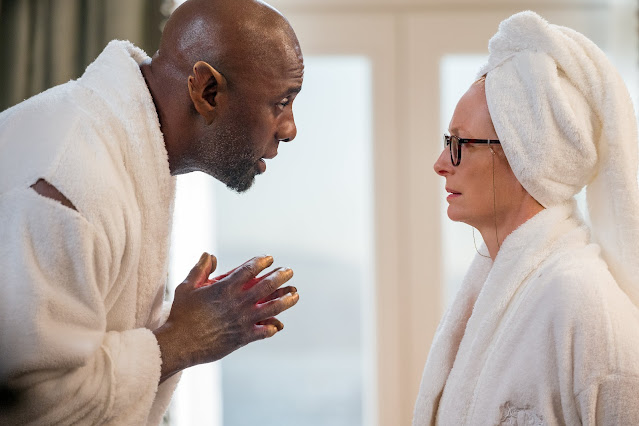 Having destroyed the earth nearly as many times as a supervillain, Miller decides to build it anew. His ode to The Archers is a magnificently opulent offering, a land of giants, lost princes, inebriate dreams of impossible, forgotten pleasures, of lords and ladies bent into supernatural postures divining the farthest reaches of the human experience. A storybook fantasy in its innocence, a trip to Plato's retreat at its most course and voluptuous, and at last a story of a connection that will never break between two beings doomed to never join. A fine effort from a man who has only allowed his imagination more room to breathe since becoming a cultural fixture.
Having destroyed the earth nearly as many times as a supervillain, Miller decides to build it anew. His ode to The Archers is a magnificently opulent offering, a land of giants, lost princes, inebriate dreams of impossible, forgotten pleasures, of lords and ladies bent into supernatural postures divining the farthest reaches of the human experience. A storybook fantasy in its innocence, a trip to Plato's retreat at its most course and voluptuous, and at last a story of a connection that will never break between two beings doomed to never join. A fine effort from a man who has only allowed his imagination more room to breathe since becoming a cultural fixture.
32. Jackass 4.5 / Jackass Forever
by Jeff Tremaine
 The boys are back in town. I enjoy the cinematic ambition of Jeff Tremaine in the original theatrical movie culled from this latest batch of daredevil grotesquery, but I'll always be partial to the straight-to-video outtake movie. In that you'll find a wider range of bits, more costumes, more of a sense of the gang and what it's like to be thrown off the horse this far into their lives. It is enormously moving that they still come together for each other and they have no compunction about interacting with each other's aging bodies and making room for the lower pain threshold some of them have while the new class of Jackass steps up to fill in for them. Our premiere comedy team, our most un-gallant dance troop, our most lovable losers.
The boys are back in town. I enjoy the cinematic ambition of Jeff Tremaine in the original theatrical movie culled from this latest batch of daredevil grotesquery, but I'll always be partial to the straight-to-video outtake movie. In that you'll find a wider range of bits, more costumes, more of a sense of the gang and what it's like to be thrown off the horse this far into their lives. It is enormously moving that they still come together for each other and they have no compunction about interacting with each other's aging bodies and making room for the lower pain threshold some of them have while the new class of Jackass steps up to fill in for them. Our premiere comedy team, our most un-gallant dance troop, our most lovable losers.
33. Skinamarink
by Kyle Edward Ball
Like Peter Strickland or Ben Wheatley, Kyle Edward Ball uses techniques culled from the avant-garde and his own nightmares, great and small, to craft a thoroughly singular piece. Trapped in a house where the adults are menacing shadows making promises to do harm, his two child aged heroes have to piece together what life is without supervision. The plot, such as it is, keeps this from being a work like the grainy experiments from which it takes its visual ideas, but as an experience, a mind-boggling trip into the unknown, I could not be more grateful it exists. A work about the confusion of childhood emotions and experiences that is every bit as confusing as it is to be a child.
34. Neptune Frost
by Saul Williams and Anisia Uzeyman
 Williams afro-futurism mixes with a more ancient sensibility and rhythm. The future can only be accessed through reckoning with what has passed. He and Uzeyman's every new image is a mind-boggling feat of creativity and ingenuity, every song designed to stick in your head but no more so than the spirit of the work.
Williams afro-futurism mixes with a more ancient sensibility and rhythm. The future can only be accessed through reckoning with what has passed. He and Uzeyman's every new image is a mind-boggling feat of creativity and ingenuity, every song designed to stick in your head but no more so than the spirit of the work.
35. Nobody’s Hero
by Alain Guiraudie
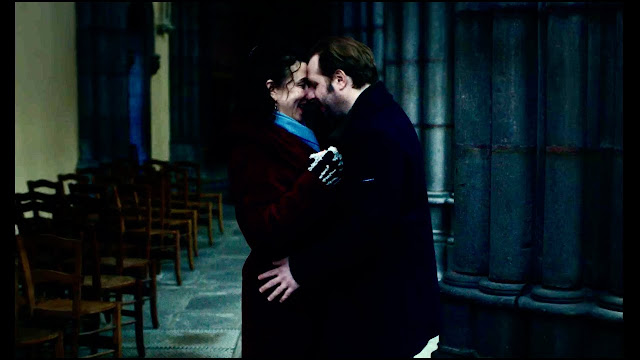 In a cramped apartment in France, the country's 21st century plays out like a play rehearsal. A lothario fixates on a sex worker who finds him irresistible, his liberalism saves a young man's life only for him to be right in kicking him out when he grows suspicious, and he's the nice one in the building. Everything he does he's right to do, and everytime there's an obstacle it's society's fault. Guiraudie's surrealist technique finds its biggest target and the steadiest hands he can manage to nail the bullseye. No one can be right all the time, but our "hero" tries and when he fails he invents a reason why he didn't. Marvelously astute criticism of masculinity between hysterical bouts of ego re-birth. A full throated chorus of "La Marseillaise" as the country sinks further and further into oblivion.
In a cramped apartment in France, the country's 21st century plays out like a play rehearsal. A lothario fixates on a sex worker who finds him irresistible, his liberalism saves a young man's life only for him to be right in kicking him out when he grows suspicious, and he's the nice one in the building. Everything he does he's right to do, and everytime there's an obstacle it's society's fault. Guiraudie's surrealist technique finds its biggest target and the steadiest hands he can manage to nail the bullseye. No one can be right all the time, but our "hero" tries and when he fails he invents a reason why he didn't. Marvelously astute criticism of masculinity between hysterical bouts of ego re-birth. A full throated chorus of "La Marseillaise" as the country sinks further and further into oblivion.
36. The Tsugua Diaries
by Maureen Fazendeiro & Miguel Gomes
 Gomes' fourth wall playset, some assembly required. To the strains of a far away guitar or to Frankie Valli's soulful pop music a film crew learns and unlearns and relearns how to make a movie with three actors, a bare set, a tractor, and nowhere to run. Covid hangs over their every move, dampening the spirit of enthusiastic improvisation, threatening to break their moral. Just getting to the end of a shoot is a victory, and having something exuberant and buoyant to show for it is more than that.
Gomes' fourth wall playset, some assembly required. To the strains of a far away guitar or to Frankie Valli's soulful pop music a film crew learns and unlearns and relearns how to make a movie with three actors, a bare set, a tractor, and nowhere to run. Covid hangs over their every move, dampening the spirit of enthusiastic improvisation, threatening to break their moral. Just getting to the end of a shoot is a victory, and having something exuberant and buoyant to show for it is more than that.
37. Coma
by Bertrand Bonello
 At home with Bertrand Bonello. A tragic Covid sleepover with the dying soul of Europe and the limbs we must remove to feel something, anything, once again.
At home with Bertrand Bonello. A tragic Covid sleepover with the dying soul of Europe and the limbs we must remove to feel something, anything, once again.
38. Hidden Fox
by Lei Qiao
 A stirring martial art standard (the doomed men-on-a-mission movie) given a new coat of paint courtesy of the energetic Lei Qiao, a name to look out for. Sun-kissed duels to the death, mountain top vengeance exacted with Rembrandt colors, wild, hungry animals in every dark corner of a mountain stronghold, and men with the thirst for blood and gold to match anything with claws; these are just a few of the chess pieces on this handsomely appointed board.
A stirring martial art standard (the doomed men-on-a-mission movie) given a new coat of paint courtesy of the energetic Lei Qiao, a name to look out for. Sun-kissed duels to the death, mountain top vengeance exacted with Rembrandt colors, wild, hungry animals in every dark corner of a mountain stronghold, and men with the thirst for blood and gold to match anything with claws; these are just a few of the chess pieces on this handsomely appointed board. 39. The Silent Twins
by Agnieszka Smoczynska
From insta-midnight movie to social problem movie, Poland's Michel Gondry is not messing around. Smoczynska's relentless inventiveness finds purchase in the story of two women who couldn't handle the world so created their own. The stop-motion and animation and drug-induced fugues all perversely help this movie's claustrophobic ambitions. We never leave the minds of these women, and so while we see things the world could not, or had no interest in, we know that there are things they could never see. To gain the world meant to lose the one you already had with the person who understood you most. Pitched between a modern social realist picture and a sugar high childhood odyssey, this film finds raw tragedy and an eerie, ordinary kind of hope. The kind we've learned not to trust.
40. X
by Ti West
 "The camera changes things."
"The camera changes things."
41. Riotsville, USA
by Sierra Pettengill
An essay on power, on the ease with which colonizers have fun at their subjects' expense. Here's what they think of the other, whoever that may be. An odd feeling to be lost in the texture of a piece, of that lithe and beautiful film grain, but know that you're being shown doomsday plans that have already been enacted. Apocalypse now, but also long before and much later. This is what we call home in America. This is where we hang our hat, or, if you like, our helmet. It was easier to plan to kill people than it was to plan for a world where that wasn't necessary.
42. Untitled (With Zoey)
by Bram Ruiter
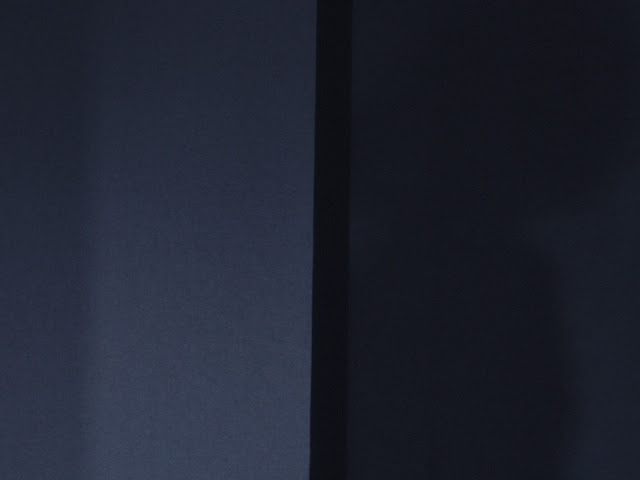 Creation pared down to the search for light. Bram's lithe geometry and playful doubling of forms finds it purest expression over the shoulder of a peer. The trust between artists, the gentle embrace of a medium with hands, the melding of a camera with a mind at study. A retreat into the sublime.
Creation pared down to the search for light. Bram's lithe geometry and playful doubling of forms finds it purest expression over the shoulder of a peer. The trust between artists, the gentle embrace of a medium with hands, the melding of a camera with a mind at study. A retreat into the sublime.
by Roland Emmerich
 There is still no one who can kill us like Roland.
There is still no one who can kill us like Roland.
44. Vesper
by Kristina Buozyte & Bruno Samper
 Kristina Buozyte & Bruno Samper, the pair responsible for Vanishing Waves, one of those sci-fi films that knocked my heart sideways when I first saw it, finally return with their latest fantastic yet all-too understandable looks at worlds beyond our understanding. Here a young girl must plan for a future on a barren planet with nothing but her father's consciousness to keep her company. Shockingly tense and bursting with visual and technical imagination, Vesper was worth waiting for.
Kristina Buozyte & Bruno Samper, the pair responsible for Vanishing Waves, one of those sci-fi films that knocked my heart sideways when I first saw it, finally return with their latest fantastic yet all-too understandable looks at worlds beyond our understanding. Here a young girl must plan for a future on a barren planet with nothing but her father's consciousness to keep her company. Shockingly tense and bursting with visual and technical imagination, Vesper was worth waiting for.
45. Avatar: The Way of Water
by James Cameron
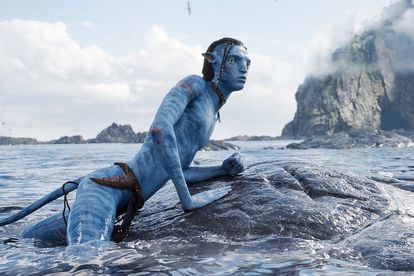 The man who truly rewrote the rules for what can still be a box office success, first by looking backwards, then by looking heedlessly forward, armed with lessons culled from Joseph Campbell and Kevin Costner. A decade has passed since our last visit to Pandora, and somehow I've come around to Cameron's fabulism, his cocktail of testosterone and peyote, his search for a way to go so far into the machinery of creation that he finds peace and tranquility. However he's doing it, it's working. Every few seconds of this dropped my jaw and had me whispering "How did he do that?" far too loudly. He made a believer out of me.
The man who truly rewrote the rules for what can still be a box office success, first by looking backwards, then by looking heedlessly forward, armed with lessons culled from Joseph Campbell and Kevin Costner. A decade has passed since our last visit to Pandora, and somehow I've come around to Cameron's fabulism, his cocktail of testosterone and peyote, his search for a way to go so far into the machinery of creation that he finds peace and tranquility. However he's doing it, it's working. Every few seconds of this dropped my jaw and had me whispering "How did he do that?" far too loudly. He made a believer out of me.
by Joseph Kosinski
Until he really does die up there on screen, I have little choice but to bow my head before his every attempt to do so. He has to die for us, he's transgressed far too much, he can't live. But then again...did anyone live as much as he did?
47. Beast
by Baltasar Kormákur
 A steadicam opera of fake lions and real trauma, or maybe it's the other way around. Kormákur's Hatari! is a little horror nightmare, of teeth in the dark and failure in the light. Idris Elba steps up to be John Wayne and his director paints his every step quickly but carefully. The stress never ceases as a man learns he can't be much of a father if he can't recognize that there are some fights you don't win. I shouted, grabbed the armrest like it was a life line, and couldn't wait for more mayhem; in other words a great time at the pictures.
A steadicam opera of fake lions and real trauma, or maybe it's the other way around. Kormákur's Hatari! is a little horror nightmare, of teeth in the dark and failure in the light. Idris Elba steps up to be John Wayne and his director paints his every step quickly but carefully. The stress never ceases as a man learns he can't be much of a father if he can't recognize that there are some fights you don't win. I shouted, grabbed the armrest like it was a life line, and couldn't wait for more mayhem; in other words a great time at the pictures.
48. Apollo 10 1/2: A Space Age Adventure
by Richard Linklater
 Linklater's essay about the TV that soundtracked his development and the ambition that never left him; to see the earth from space. He managed after a fashion, drawing portraits of every shape and size of life as we live it, the highs and lows, the drunken parties and stoned conversations, the lovers who build their world with words, the wage slaves and parents earning minimum wage, the rock stars and the nobodies, they all started in the back of a station wagon in the shadow of men headed to the moon. Linklater may not have seen us from the moon, but he has seen us with detail and understanding you couldn't get from a telescope. He sees it all, and now, at last, he's looking back at himself. This and The Fabelmans would make a bang-up south western adolescent double feature.
Linklater's essay about the TV that soundtracked his development and the ambition that never left him; to see the earth from space. He managed after a fashion, drawing portraits of every shape and size of life as we live it, the highs and lows, the drunken parties and stoned conversations, the lovers who build their world with words, the wage slaves and parents earning minimum wage, the rock stars and the nobodies, they all started in the back of a station wagon in the shadow of men headed to the moon. Linklater may not have seen us from the moon, but he has seen us with detail and understanding you couldn't get from a telescope. He sees it all, and now, at last, he's looking back at himself. This and The Fabelmans would make a bang-up south western adolescent double feature.
49. Dos Estaciones
by Juan Pablo González
A tequila empire in the shadow of a stubborn queen, who will not let the outside world rest control of her destiny from her. A ghost tour of a house built in the skeleton of industry. America dreams up its version of the Central American economy, the truth is more beautiful, more strange, more raw than anything we could tell ourselves, and this, possessed of stillness and steadfastness, is a quiet marvel.
by Claire Denis
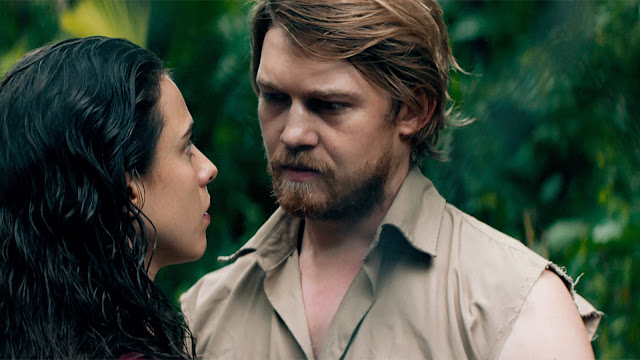 The sexuality of Claire Denis' movies is a crucial part of her syntax. Without sex, what is life? Her heroes are sex-struck, horny as if under a spell or a fever. They cannot stop their lust to save themselves, and finally that is the undoing of her heroes, living by night, fucking by day. Bazinian boys and valley girls in the countries they ruined by proxy. The devil is a functionary, and god is in the dark looking at two pale bodies falling from grace and into each other.
The sexuality of Claire Denis' movies is a crucial part of her syntax. Without sex, what is life? Her heroes are sex-struck, horny as if under a spell or a fever. They cannot stop their lust to save themselves, and finally that is the undoing of her heroes, living by night, fucking by day. Bazinian boys and valley girls in the countries they ruined by proxy. The devil is a functionary, and god is in the dark looking at two pale bodies falling from grace and into each other.
by Mia Hansen-Løve

Though it seemed like she was running out of avenues for her patient humanist mise-en-scene, Mia Hansen-Løve is back in fine form for this study of a woman caught between conflicting versions of herself; the caregiver and mother, the daughter and public figure, the lover and stubborn idealist, the woman who lives for her own pleasure and serves at the pleasure of others, the woman who knows right from wrong and the one who doesn't want to anymore. Lea Seydoux, who only seems to do great work in our best films anymore, carries the burden of Hansen-Løve's thorough and full idea of a woman at a crossroads in her life. To be sober, like her director's way of thinking through the problems presented by a woman's life, is difficult when at every turn is the temptation to stop showing up, to just be selfish. It is a good feeling to be in the company of such a generous film from such a thoughtful artist.
52. Return to Seoul
by Davy Chou
A picaresque of tragic intrigue and frustrated lust.
53. No Bears
by Jafar Panahi
 An artist in exile learning to love form again, brave enough to shoot something the way he used to, before he was imprisoned, before he became a martyr for the cause of his people. Panahi attempts to find cinema out his window and finds himself once more in the thicket of personal problems and tyrannical expectations. A film that once more finds Panahi cleverly skirting the authorities to tell the stories of the brutalized, the forgotten, the unfortunate.
An artist in exile learning to love form again, brave enough to shoot something the way he used to, before he was imprisoned, before he became a martyr for the cause of his people. Panahi attempts to find cinema out his window and finds himself once more in the thicket of personal problems and tyrannical expectations. A film that once more finds Panahi cleverly skirting the authorities to tell the stories of the brutalized, the forgotten, the unfortunate.
54. Kicking The Clouds
by Sky Hopinka
Few filmmakers have as keen an eye for the split between man and nature as Sky Hopinka, who throws one displacement device after another between our eye and the image as a mirror of our unhealthy rejection of the land. The resilience of mothers fuels this one, a beautiful 16mm diary entry about the people we lose, and how precious the art we make with our hands is in remembering them and everyone else. Whole people preserved in beads, in voice recordings, in filmed images. America takes and takes. Sky Hopinka gives.
55. Nanny / Saint Omer
by Nikyatu Jusu / Alice Diop
 A Diop diaspora double feature, primal scream therapy for displaced mothers. One, starring Anna, a cautionary tale of letting people be your master, the other, directed by Alice, a Duras-indebted testimony prepared for the ears of unfeeling gods. Let no one sit in judgment of you when they refuse to change the world so that they do not sit at the top of the food chain. "The cruelty is the point" goes the saying. We can perhaps only listen, or so it sometimes seem, but listen we must. Mothers have their babies taken and give them up all the time and both are proof of the violence of living by someone else's rules.
A Diop diaspora double feature, primal scream therapy for displaced mothers. One, starring Anna, a cautionary tale of letting people be your master, the other, directed by Alice, a Duras-indebted testimony prepared for the ears of unfeeling gods. Let no one sit in judgment of you when they refuse to change the world so that they do not sit at the top of the food chain. "The cruelty is the point" goes the saying. We can perhaps only listen, or so it sometimes seem, but listen we must. Mothers have their babies taken and give them up all the time and both are proof of the violence of living by someone else's rules.
56. You Won’t Be Alone
by Goran Stolevski
 It was only a matter of time before someone (other than me) used Malick's pointilist grammar for a horror movie and what an exciting first foray this is for director Goran Stovelski. Romantic and spare, a film about yearning, about living in your skin for the first time, of the remoteness of human beings, even if they are technically your species.
It was only a matter of time before someone (other than me) used Malick's pointilist grammar for a horror movie and what an exciting first foray this is for director Goran Stovelski. Romantic and spare, a film about yearning, about living in your skin for the first time, of the remoteness of human beings, even if they are technically your species.
57. Dead For a Dollar
by Walter Hill

Hill's three times surprised audiences with nifty digital genre pieces that rewrite his obsessions. Bullet to the Head re-cast his signature buddy comedies as something murkier, The Assignment put his loner hero in a new, re-gendered body, and Dead for a Dollar is his long-overdue tribute to the westerns of Budd Boetticher. Every thing Hill made was a western, he's claimed, but it's still nice to see a gristly, hand-made trinket from Hill's own hand with the shape of 7 Men From Now or Decision at Sundown. All men who live by the gun must eventually prove they can actually do it. Hill finds a gangster, a bounty hunter, a gambler, a widow, a soldier, and a jilted husband must meet in their hour of judgment. Hill, the oldest gunslinger of the bunch, draws fast and first. A great final chapter in his book on broken men and desperate women.
58. Dark Glasses
by Dario Argento
 Italy's black, bleeding heart emerges from semi-retirement to remind us that no genre machinery has been erected to replace the perverted long ago sorcerers who once ruled. How has this country, knowing such corruption, not emerged once more to scare and disgust audiences?
Italy's black, bleeding heart emerges from semi-retirement to remind us that no genre machinery has been erected to replace the perverted long ago sorcerers who once ruled. How has this country, knowing such corruption, not emerged once more to scare and disgust audiences?
59. All the Beauty and the Bloodshed
by Laura Poitras
 The scars of the hundred epidemics that gutted the artistic class in America during what should have been a golden age upon the unbreakable figure of Nan Goldin. There will be no accounting for the homicidal policies that killed everyone in Goldin's orbit, but she's trying. The film is, above all else, about not letting go. Not consigning the dead to history. Not allowing people to get away with their murder just because they weren't holding a gun. Not letting the million portraits and photographs and songs and paintings become museum pieces without context. Not letting death become silence. Not letting silence become permanent.
The scars of the hundred epidemics that gutted the artistic class in America during what should have been a golden age upon the unbreakable figure of Nan Goldin. There will be no accounting for the homicidal policies that killed everyone in Goldin's orbit, but she's trying. The film is, above all else, about not letting go. Not consigning the dead to history. Not allowing people to get away with their murder just because they weren't holding a gun. Not letting the million portraits and photographs and songs and paintings become museum pieces without context. Not letting death become silence. Not letting silence become permanent.
60. Fire Island
by Andrew Ahn
Andrew Ahn tries on a candy-colored melodramatic near-musical rom-com and knocks every single bit of that out of the park. Our great sensuous pioneer, whisperer of the quiet moments of connection for which we all yearn finds he's equally at home screaming as he is keeping it quiet. A joyous revamping of a classic with a cast of charismatic knock-outs. Just a shame this one didn't get a fair shake with theatrical audiences, it wouldn't have to wait so long to be called a new classic.
61. The Headhunter’s Daughter
by Don Josephus Raphael Eblahan
The crown jewel of last year's sundance slate and proof that there may be no greater eye for talent than programmer Adam Piron, this is a beautiful western fable in which our last cowboy looks for a barroom to sing her song. Unrelenting in its pursuit of true images, this remarkably gentle little movie loves its hero so purely, and its images hold her like a loving parent. Every story has been told, but the search for the quiet moment, the in-between, yields stellar things.
62. The Quiet Girl
by Colm Bairéad
 Magnificently understated, this Irish language drama finds strenght in the unspoken but steadfastly felt. A passel of excellent performances carry a young girl from uncertainty into the facts of being loved and allowing love in return, something she has yet to know. Good, honest movies like this are always needed, and the shots of embraces, of silent understanding, will last a very long time, indeed.
Magnificently understated, this Irish language drama finds strenght in the unspoken but steadfastly felt. A passel of excellent performances carry a young girl from uncertainty into the facts of being loved and allowing love in return, something she has yet to know. Good, honest movies like this are always needed, and the shots of embraces, of silent understanding, will last a very long time, indeed.
63. Thirteen Lives
by Ron Howard
 Tales of men just doing a job should never be taken for granted. With Sayombhu Mukdeeprom as his eyes, Ron Howard renders the plight of rescuers hoping they aren't too late in the closest to docu-realistic fashion he knows how. Unimaginably compelling.
Tales of men just doing a job should never be taken for granted. With Sayombhu Mukdeeprom as his eyes, Ron Howard renders the plight of rescuers hoping they aren't too late in the closest to docu-realistic fashion he knows how. Unimaginably compelling.
64. Devotion
by JD Dillard
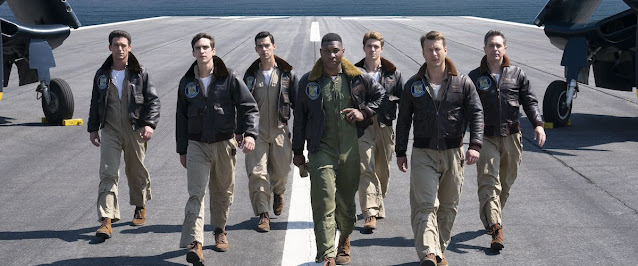 The other great movie about strapping young lads riding rockets to eternity, Devotion's post-classical eye for combat and ceremony is enormously winning. Jonathan Majors all but leaks out of his skin here, giving his all and then some to his performance of a man desperate to prove himself so no one else ever has to in the same way. A marvelously old fashioned look at the many forms courage can take, and how, typically, tears are as crucial to self-respect as any feat of strength.
The other great movie about strapping young lads riding rockets to eternity, Devotion's post-classical eye for combat and ceremony is enormously winning. Jonathan Majors all but leaks out of his skin here, giving his all and then some to his performance of a man desperate to prove himself so no one else ever has to in the same way. A marvelously old fashioned look at the many forms courage can take, and how, typically, tears are as crucial to self-respect as any feat of strength.
by Ashley McKenzie

Reaching out for someone, knowing you're only giving half your hand, is as hard as accepting someone else's when you know you aren't the one to do it. Ashley McKenzie, the young poet of co-dependency, writes another bold treatise.
66. Pearl
by Ti West
Ti West's dime novel Fassbinder fantasia finds his ingenue going to seed under the dizzying lights of promise. Mia Goth in fine form, a farm-bound Bette Davis willing a Hollywood ending out of diced bodies and screamed hopes. Tomorrow never comes for some.
67. Confess, Fletch
by Greg Mottola
 Breezy, silly, handsome, and fun, like its star, this is the little comedy that could. Replace the smug self-satisfaction of Chevy Chase's early incarnation of the character with a kind of goony knowingness, Jon Hamm tries one more time to make as big a splash as a comedic actor as he has a dramatic one. If you can't hope to follow up a performance as monolithic as Don Draper? Don't! Confess, Fletch was pilloried at worst and forgotten at best, but this is one I'll be watching for years to come. Every little character turn is memorable and larger than the last. A great and silly Boston comedy to go with all our dour sagas of poisoned masculinity.
Breezy, silly, handsome, and fun, like its star, this is the little comedy that could. Replace the smug self-satisfaction of Chevy Chase's early incarnation of the character with a kind of goony knowingness, Jon Hamm tries one more time to make as big a splash as a comedic actor as he has a dramatic one. If you can't hope to follow up a performance as monolithic as Don Draper? Don't! Confess, Fletch was pilloried at worst and forgotten at best, but this is one I'll be watching for years to come. Every little character turn is memorable and larger than the last. A great and silly Boston comedy to go with all our dour sagas of poisoned masculinity.
68. Wendell & Wild
by Henry Selick
Henry Selick returning is great, and returning with a wider canvas afforded him by benefactor and star Jordan Peele is even better. This stupendously imaginative foray into urban legends and haunted school halls is as much a "fuck you" to his early producers as it is a thank you to his new ones. His spark is undeterred and his creations are some of his most lovely to behold. A feast of sick, slick characters and lived-in detail discovering whole universes inside themselves and outside of time.
69. Alienoid
by Choi Dong-hoon
I didn't know going into Alienoid that it was part of a proposed diptych, and after two plus hours of aliens, time travel, wire work wuxia, gunplay, car chases, and family drama, I couldn't believe we still had more to look forward to. Your money's worth and then some, this absurdity has everything, including a typically incendiary turn from the underrated Kim Tae-Ri as a gun-toting warrior princess stuck in time. More movie than you'll know with what to do.
70. Corsage
by Marie Kreutzer
A love song to oneself because no one else's love is enough. A poem written in discarded dresses and torn up diary pages.
71. The Story of My Wife
by Ildikó Enyedi
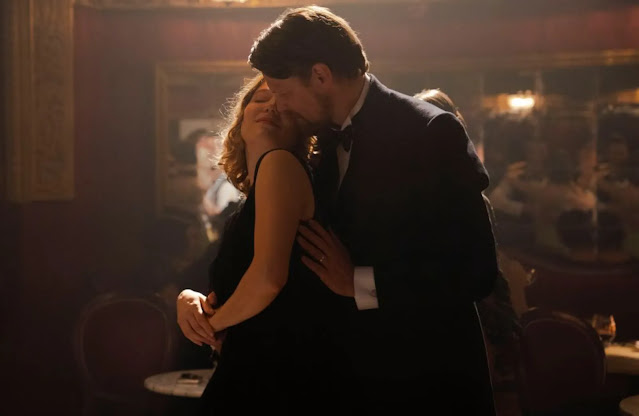 As frankly erotic as it is unnervingly depressive, this found a busy Lea Seydoux unearthing a new note in her register, a woman all too aware that she's her husband's lust object fabrication, and all too happy to keep playing dead for him. Her deep cadence and chic exterior suggests Rita Hayworth and Lauren Bacall, but Seydoux's particulars are all her own. Even in a five performance year, this one stands tall.
As frankly erotic as it is unnervingly depressive, this found a busy Lea Seydoux unearthing a new note in her register, a woman all too aware that she's her husband's lust object fabrication, and all too happy to keep playing dead for him. Her deep cadence and chic exterior suggests Rita Hayworth and Lauren Bacall, but Seydoux's particulars are all her own. Even in a five performance year, this one stands tall.
72. Listen to the Beat of our Images
by Maxime Jean-Baptiste & Audrey Jean-Baptiste
 A indigenous futurist dream of flight, of space, of the things meant only for colonizers who cannot imagine what it really means to be held, to be weightless because your ancestors support you, to be the last people but to still be alive because they could not kill you. A wonderful thing. I cannot wait to see what these filmmakers do next.
A indigenous futurist dream of flight, of space, of the things meant only for colonizers who cannot imagine what it really means to be held, to be weightless because your ancestors support you, to be the last people but to still be alive because they could not kill you. A wonderful thing. I cannot wait to see what these filmmakers do next.
by Bernard Rose
Bernard Rose takes a break from high minded punk rock lit adaptations and goes digging for heartache of a more modern variety. Tony Todd is the lonely traveler living through his fares on a long day in LA. The whole world is partying while the world burns except him, and he can't find solace in anything anymore. The towering Todd has rarely been such an exposed nerve, short with people, out of hope he'll find his missing child, surrounded by the poorest people in America's richest city. Like Three Thousand Years of Longing, a look into a kingdom from the outside.
74. God’s Country
by Julian Higgins
 When all is said and done, when revenge is finally yours, what else can you do but reach for a tall, cool Steel Reserve. Thandiwe Newton earned hers like Victor MacGlaglen in She Wore a Yellow Ribbon. She earned this. She earned so much more than this.
When all is said and done, when revenge is finally yours, what else can you do but reach for a tall, cool Steel Reserve. Thandiwe Newton earned hers like Victor MacGlaglen in She Wore a Yellow Ribbon. She earned this. She earned so much more than this.
75. Orphan: First Kill
by William Brent Bell
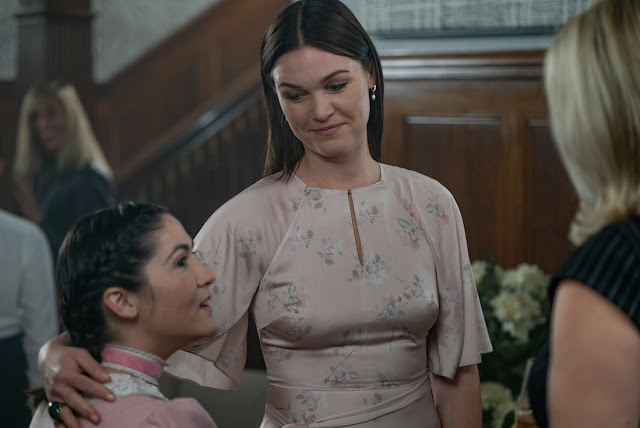 My favourite hellion returns for more outrageousness, this time with a WASP super mother who's every bit as deranged.
My favourite hellion returns for more outrageousness, this time with a WASP super mother who's every bit as deranged.
 Patton had a great year. Between his wonderfully homey stand-up special, which somehow wrings his usual neuroses and acrid consternation from domestic bliss, and his star turn as the world's worst father, he showed off parts of himself even an artist as open as Oswalt doesn't often get to showcase. I Love My Dad flirts with the grammar of sundance comedies but in Oswalt's lip-biting lead performance, it finds turf closer to Elaine May and John Cassavetes. He squirms his way to absurdity, never knowing when enough is enough, while on his own stage he shows that happiness doesn't mean perfection. One of the great chroniclers of the too-frequently forgotten side of masculinity; trying to simply show up, be present, and live for other people has its own challenges. Patton Oswalt's great project is documenting the enormity, the good, the bad, and the ugly, of being alive. Just living can be trying to manage a circus single handedly, and as I Love My Dad shows, you're only one bad decision away from losing your grip on the tent before it blows away in a storm.
Patton had a great year. Between his wonderfully homey stand-up special, which somehow wrings his usual neuroses and acrid consternation from domestic bliss, and his star turn as the world's worst father, he showed off parts of himself even an artist as open as Oswalt doesn't often get to showcase. I Love My Dad flirts with the grammar of sundance comedies but in Oswalt's lip-biting lead performance, it finds turf closer to Elaine May and John Cassavetes. He squirms his way to absurdity, never knowing when enough is enough, while on his own stage he shows that happiness doesn't mean perfection. One of the great chroniclers of the too-frequently forgotten side of masculinity; trying to simply show up, be present, and live for other people has its own challenges. Patton Oswalt's great project is documenting the enormity, the good, the bad, and the ugly, of being alive. Just living can be trying to manage a circus single handedly, and as I Love My Dad shows, you're only one bad decision away from losing your grip on the tent before it blows away in a storm.
77. No Exit
by Damien Power
 In a year with two dreary and expensive Agatha Christie riffs, this stupendous little number wrings sweat and white knuckles from a premise right out of the Dame's dream journal at half the cost and twice the fun. Havana Rose Liu is the twitching former addict trying to get home to handle some family business when a snowstorm traps her with a room full of guilty people. The questions Are just how guilty and of what? She'll find out both the hard way. Bloody, adrenaline-fueled fun on one set with a great cast.
In a year with two dreary and expensive Agatha Christie riffs, this stupendous little number wrings sweat and white knuckles from a premise right out of the Dame's dream journal at half the cost and twice the fun. Havana Rose Liu is the twitching former addict trying to get home to handle some family business when a snowstorm traps her with a room full of guilty people. The questions Are just how guilty and of what? She'll find out both the hard way. Bloody, adrenaline-fueled fun on one set with a great cast.
78. The Harbinger
by Andy Mitton
 New England's poet laureate of backyard horror strikes again, creating a never-ending bad dream of confinement, of the end of restful sleep, of an anxiety with claws and teeth. This Russian nesting doll of bad vibes starts with covid paranoia and ends with family trauma growing wings. No corner of the screen is a safe refuge, and no idea can't be consumed by the bad dreams on display.
New England's poet laureate of backyard horror strikes again, creating a never-ending bad dream of confinement, of the end of restful sleep, of an anxiety with claws and teeth. This Russian nesting doll of bad vibes starts with covid paranoia and ends with family trauma growing wings. No corner of the screen is a safe refuge, and no idea can't be consumed by the bad dreams on display.
by Elvis Mitchell
Elvis Mitchell takes a break from being the most charming film critic and talking head in the business to being one of the most charming video essayists. He renders an enormous and alienating-in-its-enormity genre cycle achingly personal and understandable. Movies with "fuck you" attitude become like valentines passed around an elementary school classroom; these weren't just the product of economic opportunity, they meant something to kids like Mitchell, who peels back the bombast to find the beating heart of works as diverse as Three the Hard Way, Coffy, and Cooley High. One of the most gripping history lessons (even for people who know the history), and all so amiably performed in Mitchell's ingratiating voice. It's always good to have Elvis Mitchell back on my TV.
80. There There
by Andrew Bujalski
 Andrew Bujalski used covid-19 to his advantage and reverse engineer a social comedy from absence and limitations. Many people's covid movies are deliberately small things, commenting neccesarily on their own existence, but Bujalski's is a bigger movie movie about pretending. Pretending you're in control, pretending your scene partner is in the room with you, pretending you're making a movie the usual way, and pretending there's still an audience for a drama about adults having honest conversations. Bristling and brittle, this little film has a lot to awaken the conflict avoidant in all of us.
Andrew Bujalski used covid-19 to his advantage and reverse engineer a social comedy from absence and limitations. Many people's covid movies are deliberately small things, commenting neccesarily on their own existence, but Bujalski's is a bigger movie movie about pretending. Pretending you're in control, pretending your scene partner is in the room with you, pretending you're making a movie the usual way, and pretending there's still an audience for a drama about adults having honest conversations. Bristling and brittle, this little film has a lot to awaken the conflict avoidant in all of us.
81. You Are Not My Mother / Here Before
by Kate Dolan / Stacey Gregg
 Two ghost stories about things still-living. In one Andrea Riseborough, on most days our greatest actress, searches for a daughter in her memory in the face of a stranger's child. In the other Hazel Doupe's mother returns from a prolonged absence, something about her has not come back. There are no easy answers when we lose what was always right in front of us and a false substitute appears.
Two ghost stories about things still-living. In one Andrea Riseborough, on most days our greatest actress, searches for a daughter in her memory in the face of a stranger's child. In the other Hazel Doupe's mother returns from a prolonged absence, something about her has not come back. There are no easy answers when we lose what was always right in front of us and a false substitute appears.
82. I Came By
One of a dozen economic parables (horror always tells the truth) this year, genre stalwart Babak Anvari slowly takes the power and agency from his characters as he reveals that life on the poverty line is life in a panopticon. No matter what you think you have, what you imagine you've earned, someone wealthier can always take it all. At times breathtakingly bleak, this further cements the Iranian director as a man unafraid of staring into abysses.
83. Emily The Criminal
by John Patton Ford
 A dynamic as old as the pictures (specifically pre-code pictures), the brassy outsider trying to make it in a world of counterfeit luxury and paper ideals. Aubrey Plaza is the Barbara Stanwyck-styled striver who will join high society or destroy it, whichever comes first. Tense as a blind date and bursting at the seams with the potential for violence, a great use of a low budget and a star looking to prove she can be small as well as huge.
A dynamic as old as the pictures (specifically pre-code pictures), the brassy outsider trying to make it in a world of counterfeit luxury and paper ideals. Aubrey Plaza is the Barbara Stanwyck-styled striver who will join high society or destroy it, whichever comes first. Tense as a blind date and bursting at the seams with the potential for violence, a great use of a low budget and a star looking to prove she can be small as well as huge.
84. The Last Movie Stars
by Ethan Hawke
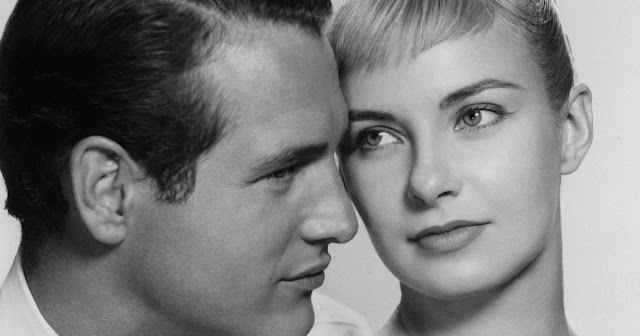 A fond look back at the land of the giants and their too-human aches.
A fond look back at the land of the giants and their too-human aches.
85. The Woman King
by Gina Prince-Bythewood
 Given someone else's version of a superhero in The Old Guard, Prince-Bythewood has given us something closer to her idea of the same thing. A cadre of outspoken, fearless warrior women out to prove something on which their lives depend. Prince-Bythewood directs with an old school sturdiness I never want to take for granted, because rock solid images of real people in genre cinema are not commonplace in America any longer. It was compared to Gladiator but the earthier setting, the more careful historicity, the beautiful costumes and make-up, and those performances all put Ridley Scott's opus in its place. An epic needn't be measured in crowd scenes with no end, nor in terms of pride and operatic dramatic turns. Sometimes it's as simple as pulling a tooth out of an old wound, or beating the hell out of someone while a dozen people watch. A movie that does every single thing it sets out to do with complete assurance.
Given someone else's version of a superhero in The Old Guard, Prince-Bythewood has given us something closer to her idea of the same thing. A cadre of outspoken, fearless warrior women out to prove something on which their lives depend. Prince-Bythewood directs with an old school sturdiness I never want to take for granted, because rock solid images of real people in genre cinema are not commonplace in America any longer. It was compared to Gladiator but the earthier setting, the more careful historicity, the beautiful costumes and make-up, and those performances all put Ridley Scott's opus in its place. An epic needn't be measured in crowd scenes with no end, nor in terms of pride and operatic dramatic turns. Sometimes it's as simple as pulling a tooth out of an old wound, or beating the hell out of someone while a dozen people watch. A movie that does every single thing it sets out to do with complete assurance.
86. First Love
by A.J. Edwards
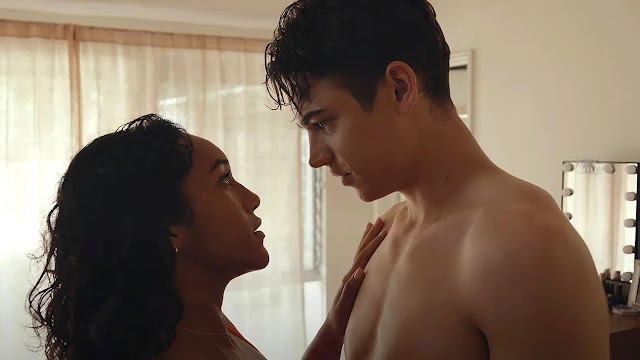 A.J. Edwards using Malick's pointillism to uncover the secrets of less sacred (though no less beautiful) objects is a good reminder that A. studios don't think Americans want art in their lives, and B. every forgotten American is worthy of representation in the art no one wants them to have. After studying Lincoln's dirt poor childhood and a teen aging out of foster care, he turns his sights to an ordinary family running out of road. As a father comes to grips with financial insecurity and the resultant inadequacy it engenders, a son tries to make a life for himself in terms with which he's unfamiliar. The simplicity is the point; two men who don't know what they're doing and are too afraid to ask for help. This is real life. The very thing most American movies want us to forget most days. Edwards may be happily in Malick's shadow, but I'm grateful he's turned his gaze to the lives of regular people experiencing everyday crises. We are going be grateful someone was paying attention in a few years time.
A.J. Edwards using Malick's pointillism to uncover the secrets of less sacred (though no less beautiful) objects is a good reminder that A. studios don't think Americans want art in their lives, and B. every forgotten American is worthy of representation in the art no one wants them to have. After studying Lincoln's dirt poor childhood and a teen aging out of foster care, he turns his sights to an ordinary family running out of road. As a father comes to grips with financial insecurity and the resultant inadequacy it engenders, a son tries to make a life for himself in terms with which he's unfamiliar. The simplicity is the point; two men who don't know what they're doing and are too afraid to ask for help. This is real life. The very thing most American movies want us to forget most days. Edwards may be happily in Malick's shadow, but I'm grateful he's turned his gaze to the lives of regular people experiencing everyday crises. We are going be grateful someone was paying attention in a few years time.
87. Hansan: Rising Dragon / The Pirates: The Last Royal Treasure
by Kim Han-min / Kim Jeong-Hoon
 Nautical twins of the wars fought, private and public, on the Korean seas. One is a battering ram of a military drama, the other a happy-go-lucky Tsui Harkian adventure, every bit as free from the confines of the ordinary as you'd hope. Both are dressed to the nines and fixing for a fight, both are immaculate entertainments. The South Korean blockbuster is a purer and more exciting thing than the American version. I should send Lotte Entertainment a bouquet of roses for continuing to bring this stuff to my front door.
Nautical twins of the wars fought, private and public, on the Korean seas. One is a battering ram of a military drama, the other a happy-go-lucky Tsui Harkian adventure, every bit as free from the confines of the ordinary as you'd hope. Both are dressed to the nines and fixing for a fight, both are immaculate entertainments. The South Korean blockbuster is a purer and more exciting thing than the American version. I should send Lotte Entertainment a bouquet of roses for continuing to bring this stuff to my front door.
88. Firestarter
by Keith Thomas
 No movie where the evidence of a missing 20 or so minutes could ever be as good as it ought be, but the feeling and talent here are too evident for me to complain. From John Carpenter's score (completing a circle begun when they took the original away from him) to the performances of Michael Greyeyes (ferocious yet understated), Kurtwood Smith (tragically haunted), and Ryan Kiera Armstrong (heartbreaking) to Keith Thomas' admirably restrained direction, there's so much to like in 90 too-short minutes. Anymore might have been too much, but any less was too little. I'll always take a movie with heart.
No movie where the evidence of a missing 20 or so minutes could ever be as good as it ought be, but the feeling and talent here are too evident for me to complain. From John Carpenter's score (completing a circle begun when they took the original away from him) to the performances of Michael Greyeyes (ferocious yet understated), Kurtwood Smith (tragically haunted), and Ryan Kiera Armstrong (heartbreaking) to Keith Thomas' admirably restrained direction, there's so much to like in 90 too-short minutes. Anymore might have been too much, but any less was too little. I'll always take a movie with heart.
89. Lou
by Anna Foerster
Anna Foerster's first outing as a feature director was an unfortunate use of her talent. How are you meant to make sense of your strengths in the context of the fifth sequel to a movie no one likes? However, starting from scratch, she's an exquisite visual stylist. The churning maelstrom that envelopes her characters is a reflection of their inner turmoil. Every crashing wave, breaking bridge, and muddy embankment one more element between two women and freedom from their past. Bone crunching set-pieces and bloodied bodies littering a journey to absolution; Foerster's proper arrival as a director.
90. Ticket to Paradise / Mrs. Harris Goes to Paris
by Ol Parker / Anthony Fabian
 The anemia that has befallen major studios means that it's possible to effectively squeeze an audience with the promise of a nostalgic pang for something that no one was ever that excited for in the first place. In hindsight, of course, people will tell you how much they love Notting Hill or One Fine Day, but they were just wallpaper at the time. One more thing you could see. Now that you can't just go to the multiplex and be charmed so when you can it's something to be treasured. Both Ticket to Paradise and Mrs. Harris don't go out of their way to play the nostalgia card (nostalgia for what? 2006?) because they know they're offering you things you truly cannot get elsewhere. And so while neither exactly breaks the mold, the stars and directors give us enough laughs and warmth to make us hungry for more easy emotional engagement. Light comedy hijinks with 1000 watt star power? Turns out we need those.
The anemia that has befallen major studios means that it's possible to effectively squeeze an audience with the promise of a nostalgic pang for something that no one was ever that excited for in the first place. In hindsight, of course, people will tell you how much they love Notting Hill or One Fine Day, but they were just wallpaper at the time. One more thing you could see. Now that you can't just go to the multiplex and be charmed so when you can it's something to be treasured. Both Ticket to Paradise and Mrs. Harris don't go out of their way to play the nostalgia card (nostalgia for what? 2006?) because they know they're offering you things you truly cannot get elsewhere. And so while neither exactly breaks the mold, the stars and directors give us enough laughs and warmth to make us hungry for more easy emotional engagement. Light comedy hijinks with 1000 watt star power? Turns out we need those.
91. Fall
by Scott Mann
 You simply must hand it to a movie that can provoke nausea with its every camera angle. Not for the faint of heart (I nearly passed out and I was laying down when I watched it) but the perfect use of a modern film screen and a modern film budget. A B -movie in the clouds. Scott Mann's one of our great thriller specialists.
You simply must hand it to a movie that can provoke nausea with its every camera angle. Not for the faint of heart (I nearly passed out and I was laying down when I watched it) but the perfect use of a modern film screen and a modern film budget. A B -movie in the clouds. Scott Mann's one of our great thriller specialists.
92. Happening
by Audrey Diwan
Diwan's cool gaze follows her heroine from post-new wave milieu study to her nauseated retreat from the freedom it promised. Her points are many but I dig that among them was that the New Wave was a space for men first and even women with all the brute force of personality in the world were still at the mercy of the less fair sex. "Cool" is a posture, an attitude. It can't buy your way out of a biological bind, and it cannot account for poor decisions at other people's expense. The Cahiers era is in need of this kind of needling and I'm heartened to know that for her next trick, Diwan will tackle Emmannuelle, another myth of liberation. Ask not for whom the Belle du Jour tolls.
93. Last Seen Alive / Memory
by Brian Goodman / Martin Campbell
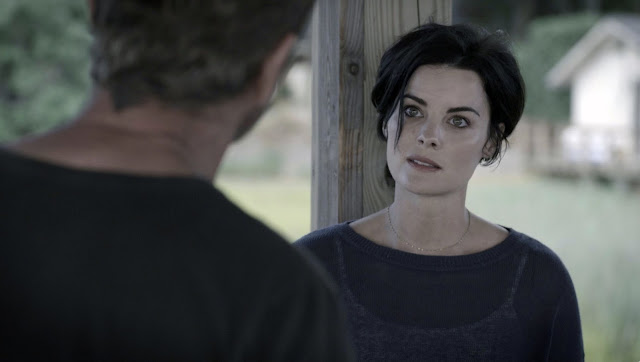 Two of our greatest action star workhorses getting a quick workout from two genre specialists working for little money but a lot of (failing) heart. The pictures may have gotten small, but the boys are as big as ever.
Two of our greatest action star workhorses getting a quick workout from two genre specialists working for little money but a lot of (failing) heart. The pictures may have gotten small, but the boys are as big as ever.
94. Nitram / Blonde
by Justin Kurzel / Andrew Dominik
Two anti-social Australian odysseys into the heart of darkness. One concerns a man who destroys everything he touches, the other a woman who only touched the men who wanted to destroy her. Both a deliberate bad time. Both crystal clear evocations of hell.
95. Gladbeck: The Hostage Crisis
by Volker Heise
 A rubbernercker's delight, a true window into madness as two men decided they'd had enough of modern life and did something about it. The sight of handsome monsters with guns on public transportation just waiting for freedom they had to know they'd never find is the most off kilter kind of uncanny sight. This just... happened. Took days to bring it to a close. We truly are powerless in the face of a will slightly stronger than the normal order. What are you going to do when people decide they're done working. That they want the better life they'd been promised? America had to answer this last year and still hasn't come up with an answer. What do you do when destiny rides the bus with a gun in its hand? Watch, I guess.
A rubbernercker's delight, a true window into madness as two men decided they'd had enough of modern life and did something about it. The sight of handsome monsters with guns on public transportation just waiting for freedom they had to know they'd never find is the most off kilter kind of uncanny sight. This just... happened. Took days to bring it to a close. We truly are powerless in the face of a will slightly stronger than the normal order. What are you going to do when people decide they're done working. That they want the better life they'd been promised? America had to answer this last year and still hasn't come up with an answer. What do you do when destiny rides the bus with a gun in its hand? Watch, I guess.
96. Nothing Compares / Sirens
by Kathryn Ferguson / Rita Baghdadi
Two searing documentaries about rock stars who were born into controversy, some at the start of their journey, some at the end, but the heartbreaking particulars are the same. It's hard out there when you're metal as fuck.
97. Lost Bullet 2
by Guillaume Pierret
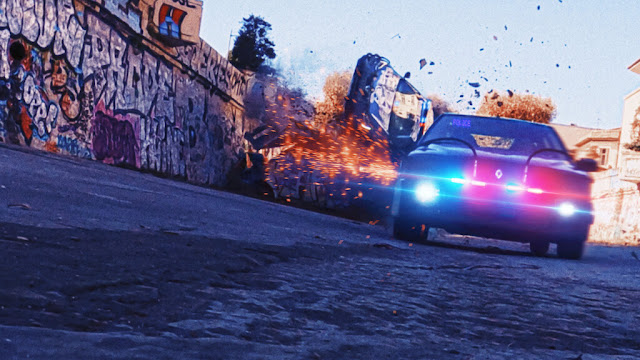 As Americans turn every gun-wielding lowlife into a superhero, the French reflect our worst tendencies back at us - same as it ever was. Our Eddie Constantine is a sleepless failure who can only prove his worth by hounding his hero's widow and blowing up an entire area code's worth of cars. The fists land like bullets, and the bullets can't catch the cars, alive with meaning, almost like some of Michael Bay's automatons. The exhale will hurt with the bruises but it will feel good when the violence is finally done for. Hopefully it won't...I'd like to see a third installment.
As Americans turn every gun-wielding lowlife into a superhero, the French reflect our worst tendencies back at us - same as it ever was. Our Eddie Constantine is a sleepless failure who can only prove his worth by hounding his hero's widow and blowing up an entire area code's worth of cars. The fists land like bullets, and the bullets can't catch the cars, alive with meaning, almost like some of Michael Bay's automatons. The exhale will hurt with the bruises but it will feel good when the violence is finally done for. Hopefully it won't...I'd like to see a third installment.
98. Descendent / Tantura
by Margaret Brown / Alon Schwarz
Brown's melancholy hymn for the pain of those who cannot stop discovering, and Schwarz requiem for the man who lost everything to find out something he already knew in his bones, people whose pain and peace of mind are wrapped up around the same divining rod. Looking for the truth of colonial hubris and the millions tortured and killed in the same name can only bring pain along with the catharsis. We must know what happened, even if there's increasingly little proof that things have truly changed.
99. Expedition Content
by Veronika Kusumaryati & Ernst Karel
 From the depths of Harvard's archives, a memorial and a séance in one truly blank canvas. The man lost to his whims and dreams, resurrected in the dark, inviting the mind to draw cave paintings of his absence, of his ambition. Music for the soul, and the gift of an image-free cinema for the mind. Unsupportable? As Daffy Duck told the agent, "I can only do it once." But once is enough.
From the depths of Harvard's archives, a memorial and a séance in one truly blank canvas. The man lost to his whims and dreams, resurrected in the dark, inviting the mind to draw cave paintings of his absence, of his ambition. Music for the soul, and the gift of an image-free cinema for the mind. Unsupportable? As Daffy Duck told the agent, "I can only do it once." But once is enough.
100. Prey for the Devil / Smile
by Daniel Stamm / Parker Finn

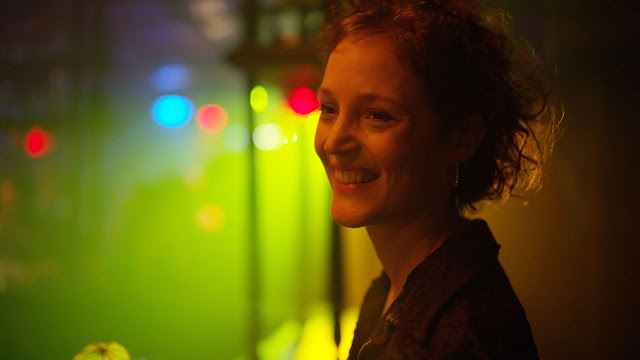

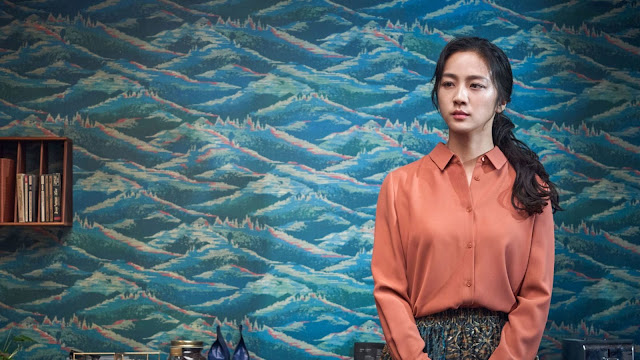

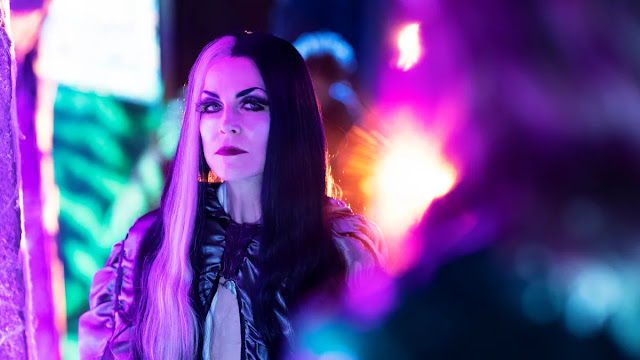



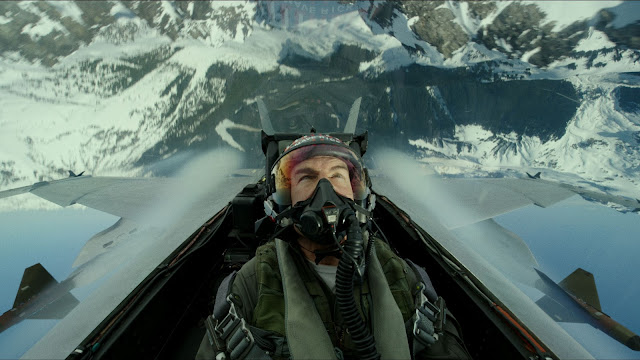











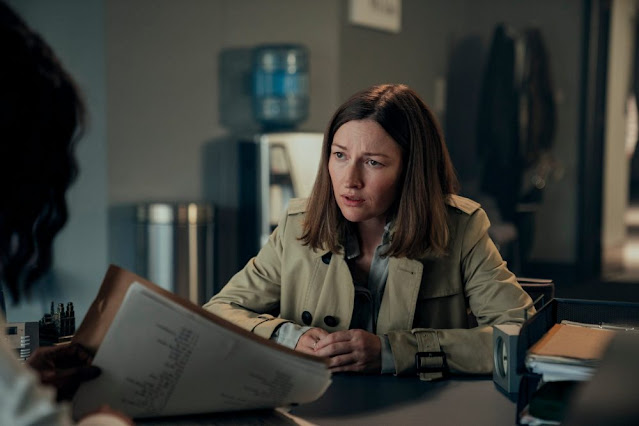






2 comments:
I thoroughly enjoyed and agree with your comments on Irma Vep. It was the finest thing on TV in a very long time. The 3 sequences in episode 7…Gottfried’s speech, Irma Vep in the bar at the end, and the compilation footage that recalls a similar scene at the end of the 1996 film…remain in my thoughts. I revisit them often. A brilliant work. Thank you for your words.
Thank you very much!
Post a Comment